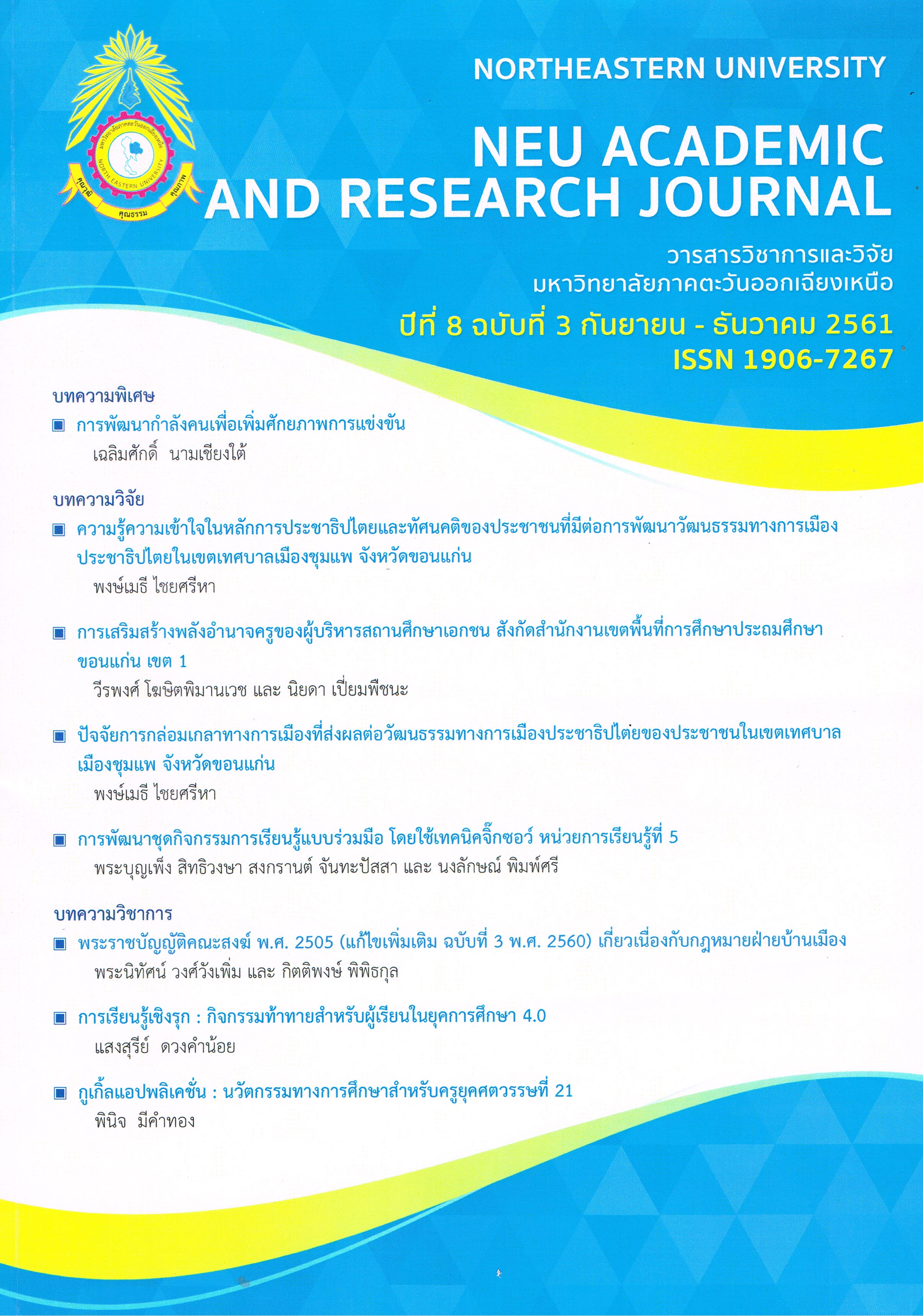การเรียนรู้เชิงรุก : กิจกรรมท้าทายสำหรับผู้เรียนในยุคการศึกษา 4.0
คำสำคัญ:
การเรียนรู้เชิงรุก, การศึกษา 4.0บทคัดย่อ
บทความนี้เป็นการเสนอแนวทางในการจัดการเรียนรู้ที่ตอบสนองเจตนารมณ์ของการปฏิรูปการศึกษาในห้วงทศวรรษที่ 2 ของประเทศไทย ที่เริ่มก้าวสู่การศึกษา 4.0 ที่เน้นการเรียนรู้ยุคดิจิทัล เน้นกระบวนการเรียนรู้ร่วมกันเพื่อ ให้เกิดทักษะสำคัญในศตวรรษที่ 21 โดยมีวัตถุประสงค์ 3 ประการ คือ 1) เพื่อสร้างแรงบันดาลใจแก่ครู อาจารย์ให้ปรับวิธีเรียนเปลี่ยนวิธีสอนที่เน้นผู้เรียนเป็นสำคัญในยุคการศึกษา 4.0 2) เพื่อเสนอตัวอย่างการจัดกิจกรรมการเรียนรู้เชิงรุกที่ใช้เวลาเหมาะสมและทำได้จริง และ 3) เพื่อนำเสนอทางออกเชิงประจักษ์แก่สถานศึกษาในฐานะที่เป็นชุมชนแห่งการเรียนรู้วิชาชีพ
การจัดกิจกรรมการเรียนรู้เชิงรุก มีประเด็นสำคัญที่ค้นพบ ดังนี้
1) แรงบันดาลใจที่บังเกิดแก่ครู อาจารย์ให้ภาคภูมิใจที่จะปรับวิธีเรียนเปลี่ยนวิธีสอนที่เน้นผู้เรียนเป็นสำคัญ ในการจัดการเรียนรู้ที่สนองการศึกษา 4.0 แต่ละระดับโดยให้ผู้เรียนร่วมมือกันเรียนรู้ แลกเปลี่ยนประสบการณ์ มีผลลัพธ์การเรียนรู้เป็นรูปธรรมชัดเจน มีผู้รู้ ผู้เชี่ยวชาญเป็นที่ปรึกษาใกล้ชิด การจัดการเรียนรู้สามรถปรับได้ตามบริบทของสถานศึกษาและตัวผู้เรียนว่า มีศักยภาพพอที่จะเรียนรู้ได้ภายในกี่ชั่วโมง กี่วัน กี่สัปดาห์ ขึ้นอยู่กับดุลพินิจของผู้สอน และปัจจัยเอื้อด้านต่าง ๆ ที่มีอยู่ในสถานการณ์
2) ตัวอย่างการจัดกิจกรรมการเรียนรู้เชิงรุกที่ใช้เวลาเหมาะสมและทำได้จริง ที่ผู้เขียนมีประสบการณ์จัดมา 2 เรื่อง ได้แก่ การจัดการเรียนรู้แบบ STEM Education และ โครงงานประดิษฐ์ (หุ่นยนต์ประกอบมือ) พบว่า ครูผู้สอนยุคการศึกษา 4.0 สามารถเรียนรู้แบบร่วมมือกันในเวลาที่จำกัดได้ เช่น 2 ชั่วโมง หรือ 3 ชั่วโมง กลุ่มละ 5 -10 คน ในที่นี้ ขอเสนอกระบวนการเรียนรู้ หลากหลายรูปแบบ ได้แก่ การเรียนรู้ที่เน้นทักษะ 3 R 8 C ในศตวรรษที่ 21 , Jigsaw Classroom Approach, Storyline Method, การเรียนรู้ STEM Education, Project-Based Learning, Problem-Based Learning, Laboratory Approach, Learning by Doing, การเรียนรู้แบบ 4 MAT, Co-operative Learningการเรียนรู้ด้วยบทเรียนโปรแกรม (CAI) การเรียนรู้โดยใช้เกมและเพลงเป็นสื่อ, Case Study, การเรียนรู้โดยใช้บทบาทสมมุติ(Role Playing)
3) ทางออกเชิงประจักษ์แก่สถานศึกษาในฐานะที่เป็นชุมชนแห่งการเรียนรู้วิชาชีพ คือ เลือกจัดการเรียนรู้ที่เหมาะสมกับบริบทสถานศึกษา ทั้งนี้ ผู้สอนก็ยังคงเป็นบุคคลสำคัญในการขับเคลื่อนนโยบายการศึกษาสู่การปฏิบัติเพื่อให้ผู้เรียนบรรลุผลสัมฤทธิ์ทางการเรียน เกิดคุณภาพและมาตรฐานตามหลักสูตร ทั้งระดับการศึกษาขั้นพื้นฐานและระดับอุดมศึกษา
เอกสารอ้างอิง
เยาวเรศ ภักดีจิตร. (2561). การเรียนรู้แบบเชิงรุก (Active Learning) สืบค้นเมื่อ 2 กุมภาพันธ์ 2561. จาก https://bunhu.wordpress.com/
สำนักงานคณะกรรมการการศึกษาแห่งชาติ. (2553). พระราชบัญญัติการศึกษาแห่งชาติ พ.ศ.2542 และที่แก้ไขเพิ่มเติม (ฉบับที่ 3) พ.ศ.2553 กรุงเทพฯ : โรงพิมพ์ สกสค.
สํานักงานเลขาธิการสภาการศึกษา. (2552). การปฏิรูปการศึกษาในทศวรรษที่สอง (พ.ศ.2552-2561) กรุงเทพฯ : พริกหวานกราฟฟิค จำกัด.
แสงสุรีย์ ดวงคำน้อย. (2558). การออกแบบการเรียนรู้ตามแนวคิดย้อนกลับ (Backward Design) การนิเทศแบบช่วยเหลือใกล้ชิด (Coaching) การวิจัยในชั้นเรียนผ่านกระบวนการโครงงาน (Classroom action Research/ Project Approach) ขอนแก่น : แก่นคำอ๊อฟเซ็ต
แสงสุรีย์ ดวงคำน้อย. (2553). รายงานการดำเนินโครงการพัฒนาสู่ประชาคมอาเซียน (Spirit of SEAN : Sister School Project). สำนักงานเขตพื้นที่การศึกษาขอนแก่นเขต 1.



